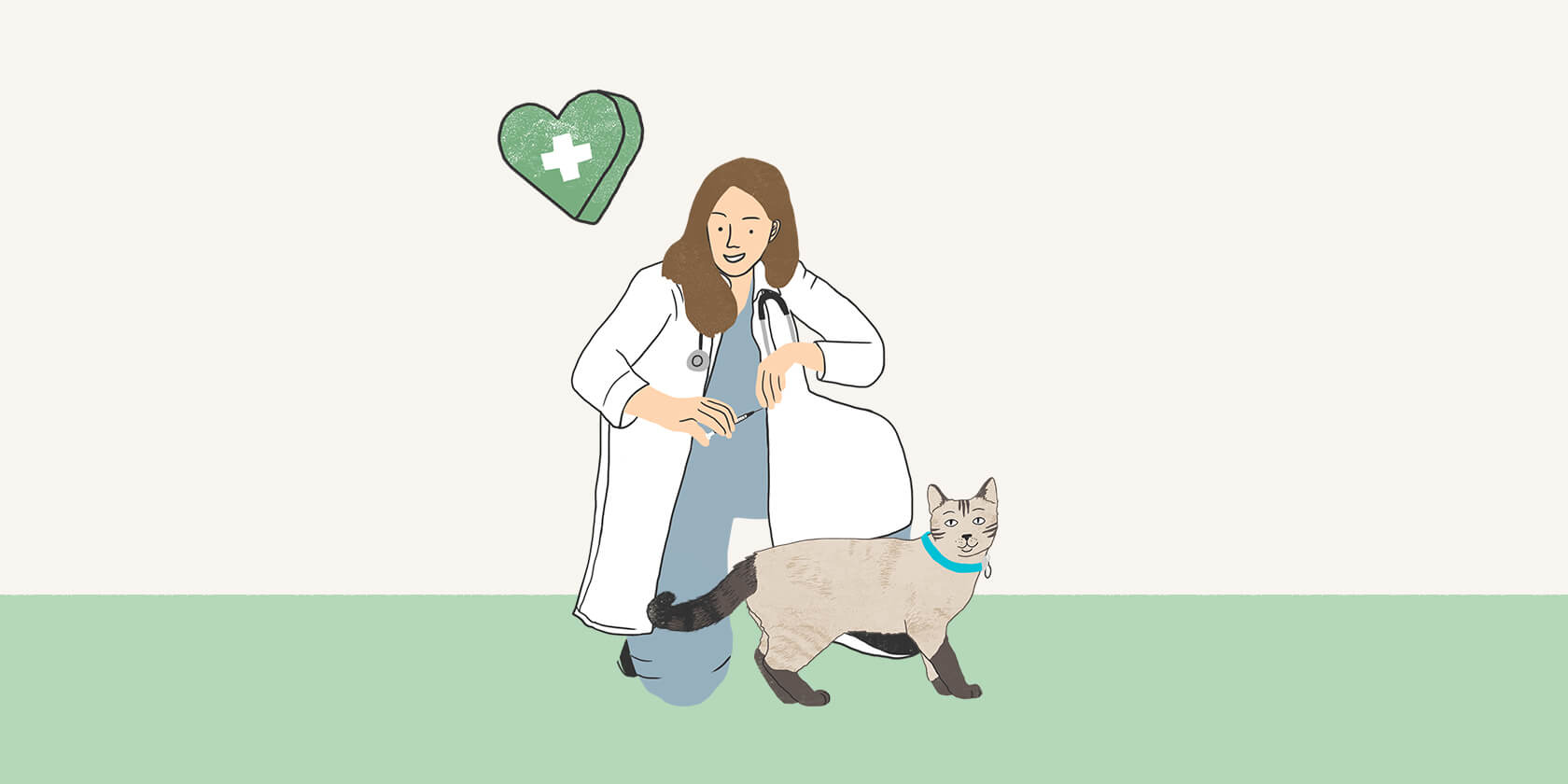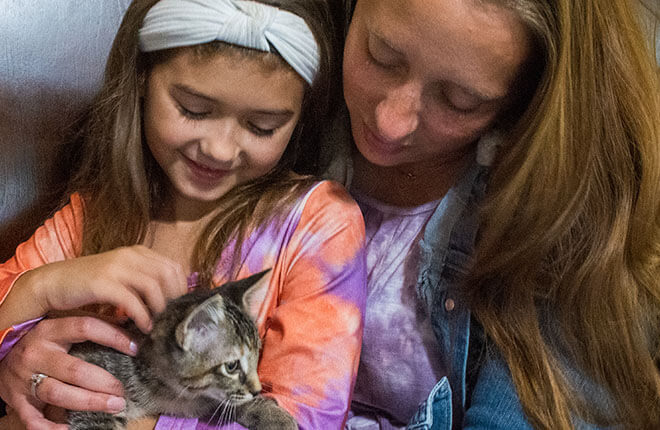Whether they’re indoor-only, outdoor, or a combo of both, cats are at risk of catching some nasty diseases. Vaccines can help by stimulating your cat’s immune system to produce antibodies against preventable diseases, so they don’t needlessly suffer or pass those diseases on to other cats.
Why Are Vaccines Important for Cats?
There are several reasons certain vaccines are recommended (and often even required) for our feline friends:
- They’re a safe and effective substitute for your cat’s first exposure to a disease. By being vaccinated, your cat develops their immunity to the disease without having to get sick.
- Vaccines can save your cat’s life. Some diseases can be fatal if not prevented.
- They help to protect other cats and people. Feline leukemia, for example, is spread from cat to cat via saliva transfer. If cats are vaccinated against the disease, transfer can’t happen. Additionally, by vaccinating cats for rabies, humans are protected from the deadly disease.
- Vaccines save time and money. Having to pay for medical care and treatment for certain diseases can be expensive and stressful.

How to Determine What Vaccines Your Cat Needs
Your veterinarian will help you determine which vaccines your cat needs and when. They’ll ask you a lot of questions and consider things like:
- Where your cat came from. Did they come from a shelter, breeder, pet store, or were they a stray?
- Your cat’s vaccination history. They’ll ask if this history is known, and whether their mother was vaccinated.
- Where your cat lives. Is your cat indoors all the time or do they have access to the outdoors and other cats? Are they a casual patio dweller during nice weather?
- Where your cat goes. Does your cat travel with you or have then been boarded?
- Other factors. These include factors like your cat’s health, as well as local laws and regulations.
Most cat vaccines are a medically necessary and cost-effective way to prevent disease for kittens, adult cats, and those with varying lifestyles. Others are considered optional and will only be recommended if your cat is likely to be at risk for those diseases.
Vaccines for Cats That Are Highly Recommended (and Why)
These vaccines are recommended for all cats based on their risk of exposure, the severity of the disease to be prevented, and the risk the disease poses to humans.
Feline Viral Rhinotracheitis
This is a herpesvirus that causes upper respiratory infections or pulmonary infections in cats. This goes far beyond a cat cold, since once a cat is infected, they are infected for life. The disease can be dormant in the cat’s system — but due to stress or other illnesses, it may be reactivated, at which time signs of disease will be more noticeable.
It’s highly contagious and can cause death due to pneumonia in kittens and immunocompromised adult cats. Mild cases can be treated at home, but severe cases can last for weeks, require hospitalization, lead to loss of vision, or become a chronic disease with stress.
Feline Calicivirus
This is a highly contagious virus that causes upper respiratory infections in cats as well as oral disease (inflammation and ulcers on the tongue and gums). Some strains of feline calicivirus can cause painful lameness in the cat’s legs as well. Cats can become re-infected with this virus, so prevention is the key to keeping cats well.
Feline Panleukopenia
Also called feline parvo or feline distemper, feline panleukopenia is a highly contagious virus caused by the feline parvovirus that invades and can kill rapidly by dividing cells in a cat’s bone marrow and intestines. The disease, which used to be the leading killer of cats, is now uncommon due to the highly effective vaccine. This is an important reason to continue vaccinating against it throughout your cat’s life.
Feline Leukemia Virus
FeLV is a retrovirus that weakens a cat’s immune system, meaning it changes the DNA of a cat’s cells, making them vulnerable to other diseases that can result in death. It’s transferred between cats through saliva or nasal secretions. Cats infected with FeLV may develop infections and cancer.
Rabies
Likely the most recognized on the list, rabies is a preventable viral disease that infects the central nervous system when a mammal is bitten by a rabid animal. The disease can infect any mammal, but it is most notable in raccoons, foxes, bats, and skunks. Cats (indoor and outdoor) can become infected when they have been bitten or encountered the saliva of an infected animal. The ultimate result is death. This disease can be transferred to humans, and pet vaccination is mandated by law in some states.
Schedule for Highly Recommended Vaccines[1]
Feline viral rhinotracheitis, calicivirus, and panleukopenia are given as a combination vaccine, often referred to as a ‘distemper shot’ for cats.
- The vaccine is first given between 6 and 8 weeks of age for kittens, and a booster is given every 3 to 4 weeks until 16 to 18 weeks of age. It is then recommended to be boostered at 6 months of age but no later than 1 year (varies with established vaccine protocols) and then every 3 years.
- For adult cats, a series of 2 vaccines are given and then a booster a year later. They will then receive a booster every 3 years after that.
Feline leukemia virus (FeLV) is usually given as a series of 2 vaccines, 3 to 4 weeks apart, starting at 9 to 12 weeks of age. It’s then followed by another 1 year later. From there, it’s given every 1 to 3 years, depending on your veterinarian's assessment of risk. Testing is recommended before administering this vaccine to determine if your cat is already positive for the disease.
The rabies vaccine is given as a single injection between 12 and 14 weeks of age. Any cat over the age of 12 weeks with unknown vaccine history should automatically be vaccinated for rabies. There’s a booster a year later. Depending on your state laws, a booster is given yearly to every 3 years. If your cat has been vaccinated and exposed to a potentially rabid animal, the booster should be administered immediately following the exposure.
Vaccines for Cats That Are Considered Optional
The following vaccines are also available to many cat owners. The decision to have your cat vaccinated against these diseases should be made in partnership with your veterinarian, who will help you consider all risk factors, your cat’s health, age, lifestyle, etc.
- Chlamydophila. An upper respiratory infection, Chlamydophila is caused by a bacterium that cannot survive outside the cat for long. Therefore, it requires close cat-to-cat contact to spread. This may cause mild respiratory illness, but more commonly causes conjunctivitis (eyelid irritation) that is mild and usually self-limiting. This vaccine is recommended for households or breeding colonies with known Chlamydophila-positive cats.
Cats have unique needs, lifestyles, and risk factors. Your veterinarian is your best resource to determine what vaccines are recommended for your cat, based on their situation, or are required by state law.
ZPC-01452R1
- 2018 Feline Vaccination Recommendations, AAFP
- What you need to know about feline coronavirus. Biogal Labs. https://www.biogal.com/blog/what-you-need-to-know-about-feline-coronavirus-fcov-fip-2/. Accessed August 2, 2021.



